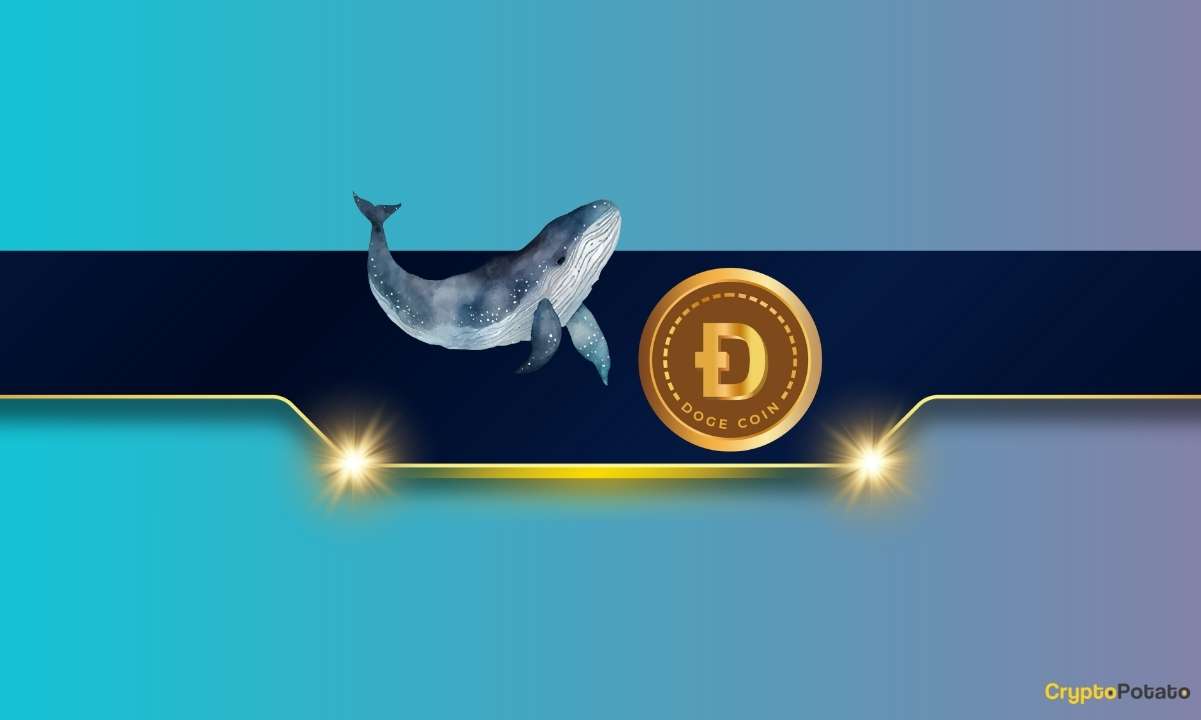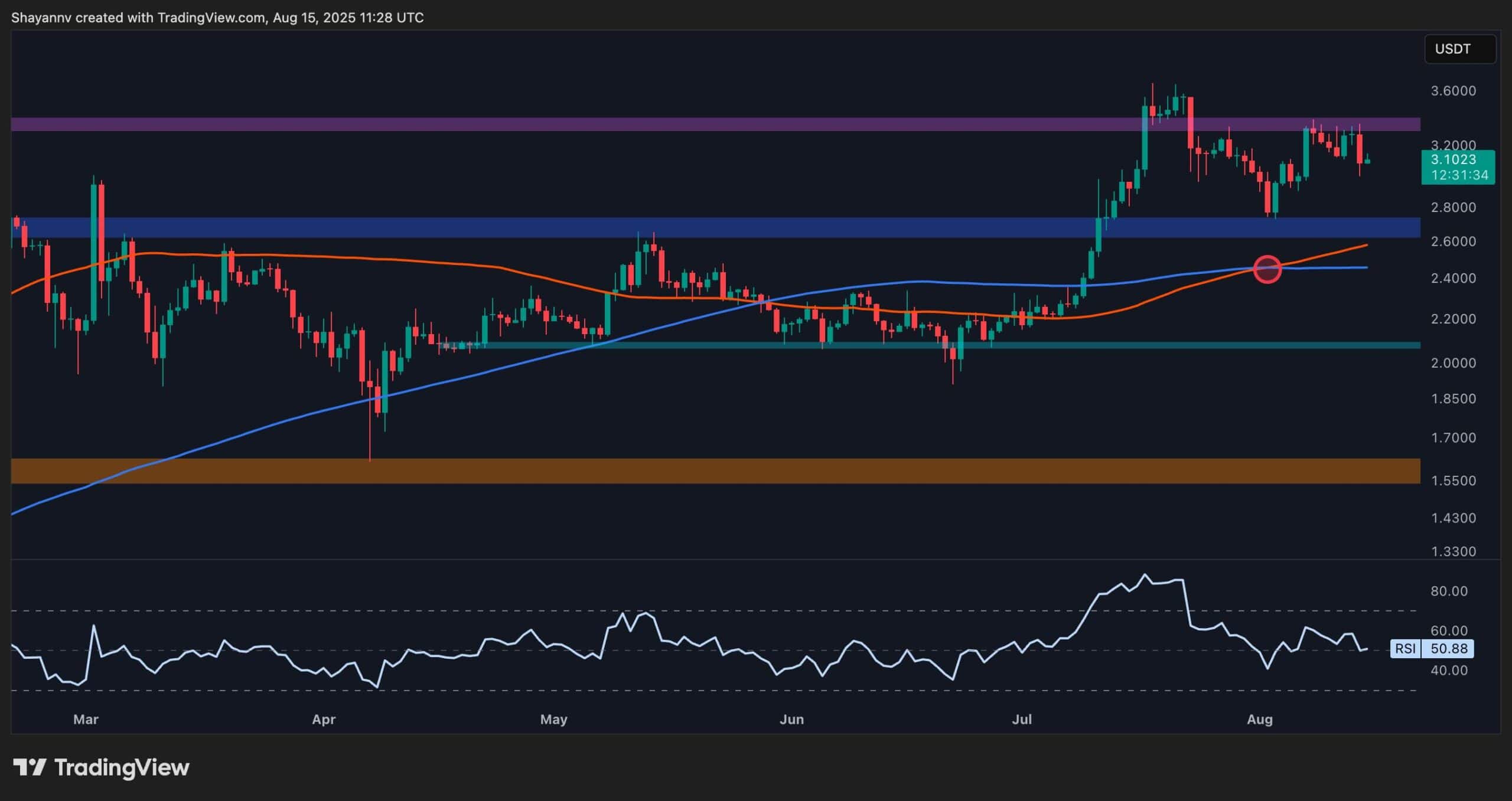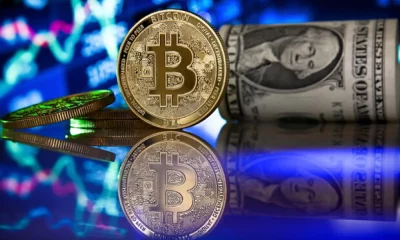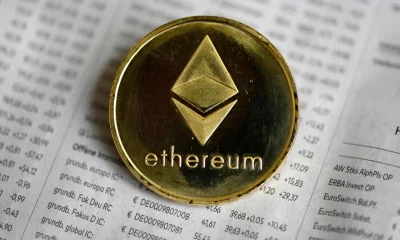Cryptocurrency
Web3 usernames may see greater adoption due to recent advancements

Ever since the Ethereum Name Service (ENS) was launched in 2017, Web3 users have been able to replace the long strings of characters that make up a crypto address with a more easily memorized blockchain username or Web3 domain name. For example, Ethereum (ETH) users can now send crypto to the network’s founder, Vitalik Buterin, at his username of vitalik.eth without knowing that his address is 0xd8da6bf26964af9d7eed9e03e53415d37aa96045.
But despite this advancement making it much easier to identify users, hardly anyone has taken advantage of it. There are over 200 million unique addresses on Ethereum, yet only 2.2 million .eth names were registered as of January. This means that at least 97% of Ethereum addresses are not associated with an ENS username.
This lack of usernames creates user experience problems in the Web3 ecosystem. Just imagine if early email addresses had consisted of long strings of characters that looked like 0x7a16ff8270133f063aab6c9977183d9e72835428 or 0x3A7937851d67Ee2f51C959663749093Dc87D9C9a. If this had been the case, Email may not have survived as a practice.
But despite this initial lack of adoption, there is some evidence that the tide may be turning in favor of Web3 usernames. A few recent advancements in wallet and messaging apps may onboard more users than ever before.
One of these advancements is better wallet integration with free usernames.
Wallet integration and free usernames
Wallets have had the ability to understand Web3 names for a long time. According to Metamask’s changelog, it introduced the ability to send to a .eth name in October, 2017, right after ENS launched. Other wallets have followed suit with this feature, including Coinbase wallet, Trustwallet, and others. Some of these wallets have also integrated with ENS rivals Unstoppable Domains, Space ID, Bonfida and others.
However, these wallets still show a crypto address to users by default, as new users don’t typically receive names automatically.
In order for a user to receive crypto via their Web3 name, they need to first register a username with a particular name provider. This means figuring out which provider to use, navigating to the providers interface, and going through the process of registering.
To make matters worse, names can be expensive. ENS names typically cost $5 and expire after a year, while Unstoppable Domains names that do not need to be renewed typically cost from $20-$40. Compare this with how easy it is to sign up for an email address for free using Gmail, Outlook, Yahoo. etc., and it’s easy to see why most crypto users don’t have a Web3 username.
A few wallet apps have been trying to solve this problem by giving away free domain names to their users. For example, Coinbase wallet allows new users to register a single .cb.id username for free, once per year, and Kresus wallet offers its users a free .kresus username of up to 8 characters as well.
This practice of giving out free usernames has begun only recently. And some popular wallets like Trustwallet and Metamask still don’t offer the feature. But as more users onboard to the Web3 ecosystem, this may lead to greater adoption of Web3 usernames over time.
Another recent advancement is instant messaging integration.
Chat messaging with Web3 usernames
Some messaging apps have begun to implement Web3 names as usernames, increasing these names’ utility beyond the payments use-case. One example is Blockscan Chat. It allows users to send instant messages to any Ethereum address or ENS username.
When messages are sent using Blockscan chat, they produce alerts on the Etherscan block explorer. If the recipient sees the alert and logs into the app, they are able to read the message. The developer of the app claims that all of its messages are end-to-encrypted. So although anyone can see if a particular user has received a message, only the sender and recipient can read it.
Web3 usernames aren’t an absolute necessity for using Blockscan chat, as it does allow users to send messages to crypto addresses as well. But names do make it much easier for users to find each other in the app.
Another example is Grill.chat, a messaging app running on the Subsocial (SUB) network. When a user first signs up for it, they are assigned a random username. But they can optionally attach an Ethereum wallet to their account. If they do this, the app automatically converts their random username into their .eth username.
Being able to find other users to chat with via their web3 usernames is arguably a more useful feature than being able to send crypto with them.
After all, the crypto community is still small. If a crypto user needs money from friends or family, they may be better off right now using traditional Web2 apps like Venmo or Apple Pay, as their friends and family may not know how to use a Web3 wallet. But if a person wants to chat specifically about crypto and Web3 apps, being able to look them up by their username could turn out to be a huge advantage. This added use-case may entice more users to adopt Web3 names in the future.
Another recent advancement in Web3 names is cross-chain names.
Cross-chain Web3 names
When Web3 names were first invented, ENS was the only protocol that could be used to create them, and it could only be used on Ethereum.
But the Web3 ecosystem has since grown to encompass many different chains. And as the number of chains has grown, so has the number of naming protocols. Users can now register Polygon (MATIC) usernames from Unstoppable Domains, Solana (SOL) ones from Bonfida, and both Arbitrum One (ARB) and BNB Chain (BNB) names from Space ID.
This fragmentation across chains can make integration difficult for wallets and block explorers and cause confusion for users. For example, suppose that a person’s Polygon username is newton.crypto. But when they go to register the same name on BNB Chain, they find that newton.bnb is already taken, so they register einstein.bnb instead. When a user looks at this person’s address on a block explorer, either name could appear, depending on which one the developer of the block explorer has chosen to display. And regardless of which one is displayed, it could cause confusion for users.
In this case for example, if a user wants to send crypto to newton.crypto via BNB Chain, they may easily send it to newton.bnb instead, which will turn out to be the wrong recipient.
A few Web3 companies are trying to fix this problem by creating a single name for each identity across multiple chains. For example, the Redefined app allows users to register for a username on Arbitrum One, but use it to receive funds on 8 other chains: Polygon, Optimism (OP), BNB Chain, Solana, Bitcoin (BTC), Fantom (FTM), Moonbeam (GLMR) and Near.
To make this feature possible, Redefined lets the user write an address or username for each network into the Arbitrum smart contract through a “manage” tab within the app. Once the addresses are listed in the contract, any person can initiate a transaction to the correct address using a “send” function within the app. In order to send funds, the sender only needs to know the recipient’s Redefined username, not the recipient’s name or address on any particular chain.
Redefined usernames begin with an @ and do not have extensions. For example, @newton and @einstein are possible redefined usernames.
Did.id, also called “.bit,” is a similar project that runs on the Nervos network. It allows users to register for a .bit username that works across 39 different networks, including Bitcoin, Ethereum, Polygon, Solana, Bitcoin Cash (BCH), Internet Computer (ICP), and many others. Registration can be done directly with a Nervos network wallet or indirectly using Polygon.
Did.id doesn’t feature a user interface with a “send” function. However, it is integrated with nine different wallet apps, including imToken, Tokenpocket, MathWallet, Huobi Wallet, Bitkeep, HyperPay, AlphaWallet, ViaWallet, and MIBAO. So it’s available to senders who use these wallets.
Cross-chain usernames are yet another new development that may spur greater adoption of Web3 usernames over time.
When will usernames catch on?
Despite these advancements, it’s still not clear how long mass adoption of Web3 usernames will take. Right now, over 90% of Web3 addresses are not associated with any username. So there is a huge hill to climb in terms of adoption. And in the meantime, users still need to cut and paste a complicated string of characters to find a person’s Web3 identity.
There is also still plenty of friction left for users, including the continuing high cost of registering a name for users of most wallet apps.
Even so, these advancements may pave the way for the mass adoption of Web3 usernames at some point in the future.
Cryptocurrency
Ethereum Foundation, Whales, and Hackers: What’s Driving the ETH Sell-Off?

TL;DR
- Whales, hackers, and the Ethereum Foundation wallets moved over $500M in ETH through large sales and withdrawals.
- Ethereum transfers rose to 4.6M ETH, nearing the monthly high of 5.2M recorded in July.
- Staking inflows hit 247,900 ETH, the highest in a month, locking more supply from trading.
Large Withdrawals and Whale Activity
Ethereum (ETH) has seen heavy movement from major wallets over the past few days. On-chain data from Lookonchain shows a newly created wallet pulled 17,591 ETH, worth $81.62 million, from Kraken in just two hours.
Over three days, two new wallets withdrew a combined 71,025 ETH, valued at $330 million, from the exchange.
One of these wallets, address 0x2A92, has withdrawn 53,434 ETH, worth $242.34 million, in two days. This includes a recent purchase of 30,069 ETH, valued at $138.46 million, during a market drop.
Major ETH Holders Offload Millions Amid Price Rally
In contrast, several separate entities have been disposing of some ETH holdings. A wallet tied to a hacker address 0x17E0 sold 4,958 ETH for $22.13 million at $4,463, securing a profit of $9.75 million. Earlier this year, the same address sold 12,282 ETH at $1,932 and later bought back part of the amount at higher prices.
A different whale sold 20,600 ETH for $96.55 million over the past two days, generating a profit of more than $26 million after holding the position for nine months.
Meanwhile, an Ethereum Foundation-linked wallet, 0xF39d, sold 6,194 ETH worth $28.36 million in the last three days at an average price of $4,578.
Recent sales from the same wallet included an additional 1,100 ETH and 1,695 ETH for over $12.7 million combined.
The #EthereumFoundation-linked wallet(0xF39d) sold another 1,300 $ETH($5.87M) at $4,518 ~11 hours ago.
Over the past 3 days, this wallet has sold a total of 6,194 $ETH($28.36M) at an average price of $4,578.https://t.co/4hfCWymHVG pic.twitter.com/ErUyEY8SJy
— Lookonchain (@lookonchain) August 15, 2025
Network Activity on the Rise
CryptoQuant data shows Ethereum’s total tokens transferred have been climbing since August 9. After ranging between 1 million and 3 million ETH through late July and early August, transfers have risen to 4.6 million ETH, approaching the monthly high of 5.2 million recorded in mid-July. This increase has occurred alongside a price rally from about $3,400 to $4,600.
Interestingly, staking inflows generally stayed between 20,000 and 80,000 ETH per day over the past month. On August 14, inflows jumped to 247,900 ETH, the highest in the period.
At the time, ETH was trading near $4,600. Large staking deposits reduce the amount of ETH available for immediate trading, as staked coins are locked for a set period.
In the meantime, ETH trades at $4,647 with a 24-hour volume of $68.25 billion, down 2% on the day but up 19% over the week.
Binance Free $600 (CryptoPotato Exclusive): Use this link to register a new account and receive $600 exclusive welcome offer on Binance (full details).
LIMITED OFFER for CryptoPotato readers at Bybit: Use this link to register and open a $500 FREE position on any coin!
Cryptocurrency
Massive DOGE Whale Activity Hints at $1 Breakout

TL;DR
- Whales bought two billion DOGE this week, lifting their combined holdings to 27.6 billion coins.
- A single 900M DOGE transfer worth $208M to Binance drew attention to large exchange movements.
- DOGE broke key resistance, with momentum building for a possible push toward the $1 price mark.
Price and Market Moves
Dogecoin (DOGE) traded at $0.23 at press time, slipping 4% over the past day but still showing a 2% gain for the week. Daily turnover came in at about $6.18 billion.
Meanwhile, the broader crypto market saw over $1 billion in liquidations. Hotter-than-expected US Producer Price Index data pushed traders to scale back expectations of a near-term Federal Reserve rate cut. DOGE had roughly 290,500 coins liquidated during the sell-off.
On the two-week chart, analyst Trader Tardigrade notes that DOGE has cleared a downward-sloping resistance line after completing what appears to be a “wave V” in an Elliott Wave sequence. Similar setups in the past, where prolonged declines stayed within falling channels before breaking higher, have been followed by sharp rallies.
$Doge/2-week#Dogecoin is gaining strong momentum to surge above $1 pic.twitter.com/TuSEKr19nv
— Trader Tardigrade (@TATrader_Alan) August 15, 2025
Momentum gauges are also turning up. The Stochastic RSI, which had dropped into oversold territory, is now heading higher. Previous reversals from this zone have coincided with sustained upward moves. The current formation points to a possible run that could carry DOGE past the $1 mark.
Heavy Whale Buying and Large Transfers
As reported by CryptoPotato, blockchain data shows large investors have added two billion DOGE in the past week, spending just under $500 million. That brings their holdings to about 27.6 billion coins, or 18% of the supply. The buying streak has prompted speculation within the community.
Recently, Whale Alert flagged a 900 million DOGE transfer worth about $208 million into Binance. The tracking indicates that it originated from a wallet connected to the exchange, likely as an internal activity. The address involved holds 2.88 billion DOGE, one of the largest balances on the network.
Ali Martinez also reports that transactions above $1 million reached a one-month high, with activity building since early August and peaking as DOGE traded at $0.25.
Whales are back! Dogecoin $DOGE activity at a 1-month high. pic.twitter.com/C83Pv68mCt
— Ali (@ali_charts) August 14, 2025
Sentiment Building
Analyst Gordon described the current setup as “a nice bit of consolidation” before a potential breakout, adding,
“This will be one of the first coins normies FLOCK to & the pump will be MASSIVE.”
With whale accumulation rising, high-value transfers increasing, and a bullish technical pattern in play, DOGE is positioned for a potential push toward $1 if momentum holds.
Binance Free $600 (CryptoPotato Exclusive): Use this link to register a new account and receive $600 exclusive welcome offer on Binance (full details).
LIMITED OFFER for CryptoPotato readers at Bybit: Use this link to register and open a $500 FREE position on any coin!
Cryptocurrency
Ripple Price Analysis: XRP at Risk as Key Support Levels Could Trigger Sharp Drop

XRP has recently entered a consolidation phase after a strong rally earlier this summer, with the price action now hovering around key resistance levels on both its USDT and BTC pairs. Yet, while momentum has slowed, the charts still indicate a generally bullish structure, with multiple key support levels remaining firmly in place.
Technical Analysis
By ShayanMarkets
The USDT Pair
On the XRP/USDT daily chart, the price is currently trading near the $3.10 mark, facing a strong resistance zone around $3.40. This follows a breakout above the $2.70 range in July, which has now flipped into a support area.
Both the 100-day and 200-day moving averages are also trending upward and recently formed a bullish crossover around $2.45, reinforcing the medium-term bullish sentiment. If the $3.40 resistance breaks, a push toward the critical $4.00 range becomes likely.
However, the RSI hovering near the neutral 50 level suggests a lack of strong momentum for now, meaning a short-term pullback into the $2.80 support zone is still possible.
This zone will be key for maintaining the bullish structure. Losing it could open the door for a deeper correction toward the 200-day moving average located around the $2.40 mark. Yet, as long as the price stays above the moving averages, the broader trend remains bullish.
The BTC Pair
Looking at the XRP/BTC chart, the pair has recently pulled back after hitting the 3,000 SAT resistance, with the price currently around 2,600 SAT.
This follows a clean breakout above the long-term descending channel and a successful retest of its upper boundary, which coincided with the 200-day moving average and the 2,400 SAT support zone. This confluence remains a key bullish technical factor, as holding above it could attract renewed buying pressure.
That said, RSI levels around 48 show that momentum has cooled after the sharp July rally, meaning XRP may continue ranging between 2,400 SAT and 3,000 SAT in the near term. A decisive close above 3,000 SAT would likely open the path to the 3,400 SAT zone, while losing 2,400 SAT could shift the bias back toward 2,000 SAT support. For now, the structure still favors the bulls as long as higher lows remain intact.
Binance Free $600 (CryptoPotato Exclusive): Use this link to register a new account and receive $600 exclusive welcome offer on Binance (full details).
LIMITED OFFER for CryptoPotato readers at Bybit: Use this link to register and open a $500 FREE position on any coin!
Disclaimer: Information found on CryptoPotato is those of writers quoted. It does not represent the opinions of CryptoPotato on whether to buy, sell, or hold any investments. You are advised to conduct your own research before making any investment decisions. Use provided information at your own risk. See Disclaimer for more information.
Cryptocurrency charts by TradingView.

 Forex4 years ago
Forex4 years agoForex Today: the dollar is gaining strength amid gloomy sentiment at the start of the Fed’s week

 Forex3 years ago
Forex3 years agoUnbiased review of Pocket Option broker

 Forex3 years ago
Forex3 years agoDollar to pound sterling exchange rate today: Pound plummeted to its lowest since 1985

 Forex3 years ago
Forex3 years agoHow is the Australian dollar doing today?

 Cryptocurrency3 years ago
Cryptocurrency3 years agoWhat happened in the crypto market – current events today

 World3 years ago
World3 years agoWhy are modern video games an art form?

 Commodities3 years ago
Commodities3 years agoCopper continues to fall in price on expectations of lower demand in China

 Economy3 years ago
Economy3 years agoCrude oil tankers double in price due to EU anti-Russian sanctions

































